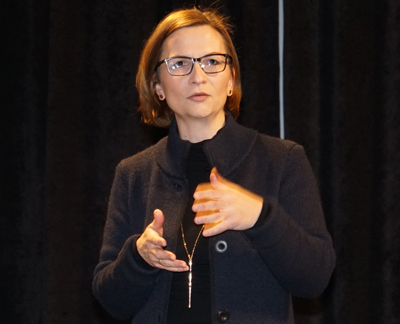
FDIC Chair Jelena McWilliams is resigning early after allegations that Democratic board members were attempting to take control of the agency.
As reported by the Wall Street Journal, her decision to resign Feb. 4 clears the path for Democrats to gain control of the FDIC agenda, which could lead to tougher requirements around bank mergers, climate change and other efforts.
McWilliams, who immigrated to the United States from Yugoslavia as an 18-year-old in 1991, has led the FDIC since being appointed in 2018 by former President Donald Trump.
McWilliams: Numerous attempts illustrate attempted FDIC takeover
The Journal reported that her decision to leave now came after deciding that her relationship with fellow board members would likely remain strained, especially with FDIC board member Rohit Chopra, Biden-appointed director of the Consumer Financial Protection Bureau. She reportedly believed that an ongoing fight would demoralize staff and make the agency appear political.
McWilliams summed up her displeasure with the internal tension in a Dec. 15 WSJ column. In it, she said the infighting began Oct. 31 when Chopra presented her with a finished document requesting public comments on the FDIC’s merger review process and insisted it be published, a request McWilliams described as “unprecedented.” To her, the document “was filled with omissions, misrepresentations and technical inaccuracies.”
Just last month, Democratic board members of the FDIC — Chopra, former FDIC chair Martin Gruenberg and acting Comptroller of the Currency Michael Hsu — opted to launch a regulatory process related to bank mergers without McWilliams’ support, who blocked that request from being published by her agency and rejected the request from Democrats to have the vote reflected as a valid board action on Dec. 14. Their action signaled that officials were trying to set the agenda for the FDIC and not waiting until McWilliams’ term expired, according to the Wall Street Journal.
McWilliams said that while traveling for business to Europe Nov. 16 and shortly after informing Hsu that the FDIC staff document would be available to board members no later than Dec. 6, directors sent a joint letter telling FDIC staff to instead mark up their original document.
“The board members’ letter was an attempt to seize control of the FDIC’s staff while its chairman was on a nine-hour flight to Europe for official meetings,” McWilliams wrote.
McWilliams was again alarmed when on Nov. 26, a deputy to Chopra sent an email from his CFPB account to the FDIC board distribution list, purporting to circulate a vote on Chopra’s document, a move McWilliams called “a brazen attempt to seize control from the FDIC executive secretary, who alone is in charge of official board distributions.”
McWilliams said FDIC staff produced a document on Dec. 6 to board members to solicit public feedback. “It asked broad-based questions on the statutory factors that govern merger applications and whether the FDIC’s existing approach is appropriate,” McWilliams noted. However, only hours after receiving the document, board members tried voting on the original CFPB document. On Dec. 3, three days before receiving the FDIC document for review, Chopra and Gruenberg were informed that their actions didn’t constitute a valid vote but still posted their document on the CFPB website and claimed it was an official FDIC issuance.
In her column, McWilliams called the tension “an example of the erosion of America’s democracy.” She did not, however, mention any tension when she announced her early departure Friday in a letter to President Joe Biden. Instead, she spoke glowingly of her tenure “alongside the dedicated career professionals of the FDIC.”
Banking trade groups: McWilliams a quality chair
American Bankers Association President and CEO Rob Nichols thanked McWilliams for her service. “Her efforts during the ongoing pandemic have allowed banks of all sizes to serve as a source of strength for the economy, while maintaining their commitment to safety and soundness,” he said. “We appreciate her willingness to listen to all stakeholders in addressing policy issues, and particularly appreciate her strong support for initiatives to reduce the number of unbanked Americans and promote financial inclusion.
Consumer Bankers Association President and CEO Richard Hunt noted the FDIC board “will be without any ideological balance for the first time in recent memory.” He called on the Democratic Party-dominated board to not pass new regulations or rules until a replacement member representing Republicans is seated.
FDIC Advisory Committee member Betsy Johnson called McWilliams “one of the main factors in determining my acceptance” into the committee. “She put forth a great effort to support community banking, not only in words but also in action,” said Johnson, president and CEO of Forreston, Ill.-based Solutions Bank. “I am sure we have not seen the last of her in the financial sector. There is no doubt she will be successful in any new endeavor she chooses.”
